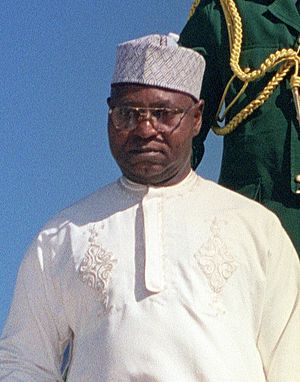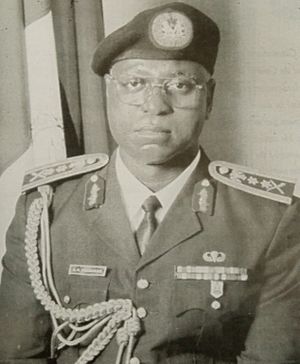Abdulsalami Abubakar facts for kids
Quick facts for kids
General
Abdulsalami Abubakar
|
|
|---|---|
 |
|
| 11th Head of State of Nigeria | |
| In office 9 June 1998 – 29 May 1999 |
|
| Chief of General Staff | Michael Akhigbe |
| Preceded by | Sani Abacha |
| Succeeded by | Olusegun Obasanjo |
| Minister of Defence | |
| In office 9 June 1998 – 29 May 1999 |
|
| President | Himself |
| Preceded by | Sani Abacha |
| Succeeded by | Theophilus Danjuma |
| Chief of Defence Staff | |
| In office 21 December 1997 – 9 June 1998 |
|
| Preceded by | Oladipo Diya |
| Succeeded by | Al-Amin Daggash |
| Personal details | |
| Born | 13 June 1942 Minna, Northern Region, British Nigeria (now Minna, Niger State, Nigeria) |
| Spouse | Fati Lami Abubakar |
| Children | 7 |
| Residence | Minna |
| Occupation | Military officer |
| Military service | |
| Allegiance | Nigeria |
| Branch/service | Nigerian Air Force Nigerian Army |
| Years of service | 1963–1966 (Air Force) 1966–1999 (Army) |
| Rank | General |
| Battles/wars | Nigerian Civil War 1978 South Lebanon conflict |
Abdulsalami Abubakar (born 13 June 1942) is a retired Nigerian army general. He served as the military head of state of Nigeria from 1998 to 1999. He was also the Chief of Defence Staff from 1997 to 1998. He took over after General Sani Abacha passed away.
During his time as leader, Nigeria adopted a new version of its 1979 constitution. This constitution allowed for elections with many political parties. He handed over power to the newly elected president, Olusegun Obasanjo, on 29 May 1999. Today, he is the Chairman of the National Peace Committee.
Contents
Early Life and Education
Abdulsalami Abubakar was born on 13 June 1942 in Minna, Niger State, Nigeria. His parents were Abubakar Jibrin and Fatikande Mohammed. He belongs to the Hausa ethnic group.
He went to Minna Native Authority Primary school from 1950 to 1956. For his secondary education, he attended Government College, Bida, from 1957 to 1962. He also studied at Kaduna Technical College in 1963.
Military Career
Joining the Air Force
Abubakar was among the first groups of officer cadets to join the Nigerian Air Force. He enlisted on 3 October 1963. From 1964 to 1966, he received military training in Uetersen, West Germany. When he returned to Nigeria in 1966, he was moved to the Nigerian Army.
Serving in the Army
After joining the army in 1966, Abubakar became a second lieutenant in the infantry division in October 1967. He held various important roles, including commanding officer of different infantry battalions. From 1978 to 1979, he was a commanding officer for a Nigerian battalion with the United Nations Interim Force in Lebanon.
He also served as chief instructor at the Nigerian Defence Academy from 1980 to 1982. Later, he became the military secretary of the army from 1986 to 1988. From 1997 to 1998, General Sani Abacha appointed him as the Chief of Defence Staff. After Abacha's death on 8 June 1998, Abubakar became the military President and Commander in Chief of the Armed Forces of Nigeria.
Presidency
Leading the Country
Nigeria had been under military rule since 1983. Although democratic elections were held in 1993, they were cancelled. Abdulsalami Abubakar became president on 9 June 1998, following the unexpected death of the previous leader. He announced a week of national mourning.
Bringing Back Democracy
Soon after taking office, Abubakar promised to hold elections within a year. He wanted to transfer power to an elected president. He created the Independent National Electoral Commission (INEC). This commission was in charge of organizing the elections.
The INEC held several elections. These included elections for local governments, state assemblies, governors, and national assemblies. Finally, the presidential election took place on 27 February 1999. Even though efforts were made to make the elections fair, some problems were noted by international observers.
Transferring Power
In May 1999, General Abubakar surprised some people by handing over power. He transferred it to the newly elected civilian president, Olusegun Obasanjo. After this, he retired from the army.
Legacy and Contributions
Abdulsalami Abubakar's time as leader is remembered for different reasons. He faced some criticism because he had supported the previous government, which was known for human rights issues. He was also involved in a lawsuit regarding the death of the 1993 president-elect, Moshood Kashimawo Olawale Abiola, who died while in custody.
However, Abubakar also played a role in peace efforts. He helped with the Liberian peace movement by leading peace talks in 2003. He also chaired a group that observed the 2002 Zimbabwe presidential election. This group concluded that the election conditions did not fully allow people to express their will freely.
Some people have raised concerns about the 1999 constitution that his government helped create. They believe it has caused some tension between different groups and religions in Nigeria.
Personal Life
Abdulsalami Abubakar is married to Fati. They have six children together.
Health Update
On 12 July 2025, it was reported that Abdulsalami Abubakar had a health issue and was in a London hospital. He later confirmed this and stated that he had been discharged from the hospital.
Awards and Honours
Abdulsalami Abubakar has received many awards and medals for his service. Some of these include:
- Defence Service Medal
- Distinguished Service Medal
- Forces Service Star
- General Service Medal
- Grand Commander of the Order of the Federal Republic of Nigeria (GCFR)
- International Gold Medal, from the Economic Community of West African States
- Meritorious Service Star
- National Service Medal
- Republic Medal
- Rainbow/PUSH Coalition Peace Prize
- Silver Jubilee Medal
- Order of the Star of Ghana
- Ufuk Dialogue Peace Award 2022
See also
 In Spanish: Abdulsalami Abubakar para niños
In Spanish: Abdulsalami Abubakar para niños
- Nigerian Third Republic
- Nigerian Fourth Republic
- List of Hausa people
 | James Van Der Zee |
 | Alma Thomas |
 | Ellis Wilson |
 | Margaret Taylor-Burroughs |


